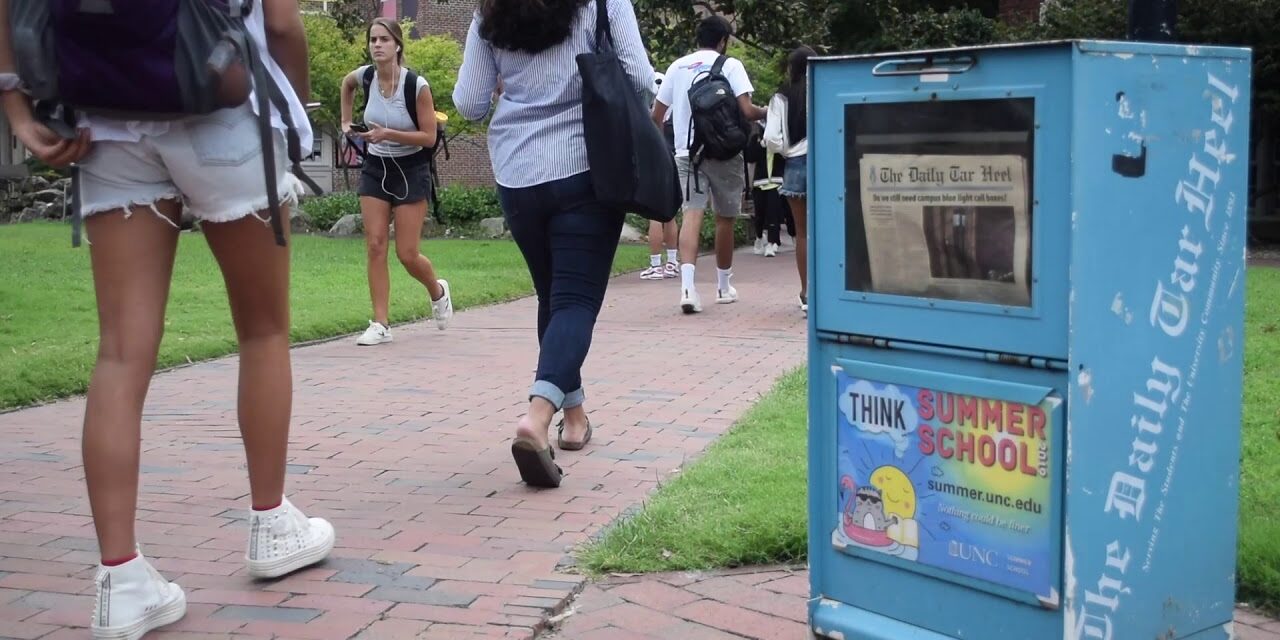For local student journalists, the rules and expectations are seemingly simple. “Print news, raise hell,” as The Daily Tar Heel motto puts it. Good, hellish news, though, comes at the steep price of sacrificing mental health, wellness and life outside of the newsroom — a cost written between the lines and often realized too late.
“I had a really rocky start with UNC,” said Liv Reilly, a rising senior and former University Desk editor at The Daily Tar Heel. “I still kind of have. I never really quite found a place that I really fit in and it was just a really hard transition that first semester of college.”
For many students like Reilly at the start of the COVID-19 pandemic, the beginning of college, an already difficult experience for even the most prepared, was made harder by a myriad of mounting pressures. Making friends and finding a routine was nearly impossible, not to mention the ongoing concerns about racism, accessibility, and, of course, mental health, on campus.
In addressing mental health concerns, psychotherapy resources can play a pivotal role in providing students with a safe space to explore and manage their emotions. Psychotherapy, also known as talk therapy, involves discussions with a trained therapist to address a range of issues, from stress and anxiety to more complex emotional challenges.
For student journalists facing the unique stressors of their field, psychotherapy can offer valuable coping mechanisms, stress management strategies, and a confidential outlet to express their thoughts and feelings. Embracing psychotherapy resources as part of a holistic approach to mental health can contribute to the resilience and well-being of student journalists, ensuring they navigate their academic and professional journeys with a supportive foundation.
Reilly was planning on dropping out of UNC — she spoke with an academic advisor, signed the necessary paperwork and was ready to find her place far from campus. Then, when she miraculously was placed in every single journalism class she wanted that semester (a known rarity at UNC) and was offered the opportunity to step forward into an assistant desk editor position at the DTH, she decided to give it all another shot.
“I wasn’t going to apply, I had only been on staff for one semester,” she said. “I didn’t think I could be editing other people’s stuff when I was still learning.”
But when her editor asked her to apply, even though Reilly had doubts, her answer was easy. “Of course I did,” she says. That semester, she began her tenure as assistant university desk editor before serving as university desk editor for the 2022-23 academic year.
The Daily Tar Heel gave her the Carolina home she was desperately looking for — but still, it was hard.
“It’s just a lot in this day and age to be a journalist and to keep track of every single thing that’s going on,” Reilly said. “Twenty years ago, they’d come into the newsroom from 2 p.m. to midnight, then they’d all go out late somewhere to eat, and then when they left the newsroom, they left the newsroom. Now, in this generation of journalists, we never get to ‘leave’ the newsroom.”
With the digitization of the world and heavy emphasis on immediacy in online news, even when it’s unattainable, journalists don’t have the same luxury of rest and breaks former generations who adhered to the print news cycle did. Student journalists aren’t exempt from this pressure.
Hannah Collett, also a rising senior at UNC who was a copy desk editor at The Daily Tar Heel, experienced a similar journey to Reilly. She rose quickly through the leadership hierarchy and was thrust into a fast-paced world of high expectations and responsibility.
“The news cycle never stops,” Colett said. “We could never really take a break. You try to set boundaries but you also feel like, all my friends are on the copy desk or all of them are on management or whatever the case is, if I go home at 10:30 and they stay in the office until 2 a.m. trying to get this work done, that’s so much work that I could have been helping them do and that puts even more pressure on them.”
“We’re all doing the same hours. We’re all tired. How could I turn around and do that to my friends?”
But, just like Reilly, Collett loved the DTH more than anything. Like Reilly, that newsroom was the homebase of her Carolina experience, and home is a place you love even when you leave it. And still, her farewell column, which she wrote one year earlier than expected, was entitled “The DTH Doesn’t Love Me Back.”
“I can confidently say that — like nearly every editor here — I have given this newsroom my everything,” she wrote in her farewell column. “I have given it my time. I have given it my grades and my sleep schedule. My passion. My effort. And though it’s hard to admit, I have also given it my health and my well-being.”
But this was also why she stayed as long as she did, Collett said. She was in love. Even unrequited, she didn’t leave the DTH newsroom with nothing.
“Even in the face of all the endless work we had to do — everywhere I turned, there was always something left to love.”
Take it must, but the journalism industry infamously forces its writers to pour from an empty cup, emotionally and physically. Like a teacher who is expected to work too hard with no reward for “the love of it”, journalism is the same, Collett said. “Passion, not protection.”
But this is not a Daily Tar Heel problem. It’s a journalism problem, one stretching from the newsroom on Franklin street to offices and notebooks across the state, like the ones Sara Pequeño found herself in.
As an opinion writer at the age of 25, her youth, small stature and feminine appearance all threw roadblocks in her path to journalism — a road already fraught with challenges.
“I ended up at the News and Observer and being a columnist is one of the most isolating jobs in the world,” Pequeño said. “All of it’s complicated, again, by being a young woman in a newsroom.”
Even as young journalists are writing about emotionally heaving topics in society, like racism, sexism, and ableism, the writers are not unaffected by those issues. The society they write about on the page also exists within the walls of a newsroom, even as they examine the conversation from just outside of it, not within.
“I think that a lot of the things that you as a young femme person see out in the wild, just in your everyday life, really becomes more present in a newsroom setting — just because of the fact that you’re trained to look for it by nature,” Pequeño said. “That is something that does become, to me, hard to ignore when you’re in a setting like that.”
Like Collett, one of her scariest moments as a writer so far was the moment she decided to step away.
“This is the world I get to choose,” Pequeño said. She is now embracing a career as a full time freelancer for the first time.
Prioritizing wellness, in a machine profiting from the creative cogs being unwell, is overwhelmingly brave. It is a terrifying choice to choose yourself.
“As tiring as it is, I love it,” Reilly said. “It’s a huge part of who I am and I’m so thankful for that.”
Even on the other side of that hardest moment, though, their love and adoration for journalism, in all its wonders and flaws, remains steady.
“I love it enough,” Collett said, “I’d let it break me.”
Photo via The Daily Tar Heel.
Chapelboro.com does not charge subscription fees, and you can directly support our efforts in local journalism here. Want more of what you see on Chapelboro? Let us bring free local news and community information to you by signing up for our biweekly newsletter.





